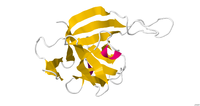
Photo from wikipedia
Interleukin-12-based local gene therapy of cancer constitutes an active area of clinical research using plasmids, mRNAs and viral vectors. To improve antitumor effects, we have experimentally tested the combination of… Click to show full abstract
Interleukin-12-based local gene therapy of cancer constitutes an active area of clinical research using plasmids, mRNAs and viral vectors. To improve antitumor effects, we have experimentally tested the combination of mRNA constructs encoding interleukin-12 (IL-12) and interleukin-18 (IL-18). Moreover, we have used a form of IL-18 (DR-18) which has preserved bioactivity but does not bind to the IL-18BP decoy receptor. Both cytokines dramatically synergize to induce IFNγ release from mouse splenocytes, and, if systemically co-transferred to the liver, they mediate lethal toxicity. However, if given intratumorally to B16OVA tumor-bearing mice, the combination attains efficacy against the directly treated tumor and moderate tumor-delaying activity on distant uninjected lesions. Co-treatment was conducive to the presence of more activated CD8+ T cells in the treated and non-injected tumors. In keeping with these findings, the efficacy of treatment was contingent on the integrity of CD8+ T cells and cDC1 dendritic cells in the treated mice. Furthermore, efficacy of IL-12 plus DR-18 local mRNA co-injection against distant concomitant tumors could be enhanced upon combination with anti-PD-1 mAb systemic treatment, thus defining a feasible synergistic immunotherapy strategy.
Journal Title: Cancer immunology research
Year Published: 2022
Link to full text (if available)
Share on Social Media: Sign Up to like & get
recommendations!